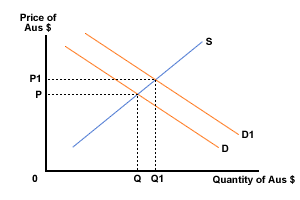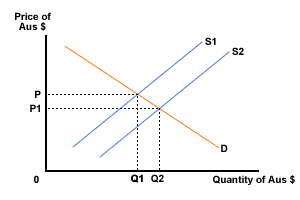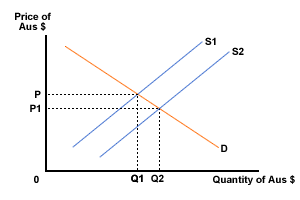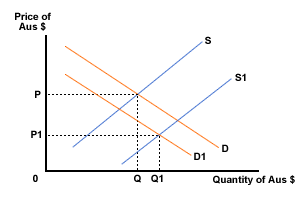Causes of changes in exchange rate
As already shown, the exchange rate is affected by the state of the economy indicated by inflation, interest rates and balance on trade. We now consider these influences using the example of Australian economy.
Balance of trade
A surplus in the balance of trade (X>M) means that DAus$ > SAus$ , i.e. there is net increase in DAus$ . This causes an upward pressure on the exchange rate. The exchange rate will appreciate. This is illustrated in Figure 1 below:

Figure 1 Australian trade surplus - impact on exchange rate
Alternatively, a deficit in balance of trade will result in net increase is SAus $ and result in downward pressure on the exchange rate as shown in Figure 2 below. The exchange rate will depreciate.

Figure 2 Australian trade deficit - impact on exchange rate
Interest rates
Differences in interest rates between different countries affect the investment flows (capital flows) between these countries and will, in return, affect the exchange rate
Capital flows exert a greater influence on exchange rates than trade flows. This is because the fund managers of international financial organisations and multinational corporations, and rich individuals, move more money around the globe on a daily basis than is accounted for by trade flows. They do this to take advantage of differences in relative interest rates and changes in exchange rates, or they may be speculating on future movements in such variables.
If interest rates were to fall below those in other major economies, or international speculators were pessimistic about the future of the Australian economy, or predict a large depreciation in the Australian $, they might decide to sell their holdings of Aus $ and convert them into yen. This would increase the demand for yen, while increasing the supply of Aus $'s, which causes a depreciation of the currency. This can be seen in Figure 3 below:

Figure 3 Australian capital outflows - impact on exchange rate
An increase in Australian interest rates relative to others, or greater optimism about the future of the Australian economy will enable investors to earn higher returns Consequently, speculators / fund managers might decide to move funds currently being held in yen into Aus $'s. This will have the reverse effect As the Aus $ will appreciate as the demand for it increases (indicated by a rightward shift of the demand curve for Aus $'s).
Inflation
A higher rate of inflation in Australia, than in other countries, will make Australian exports less competitive and may lead to less exports being sold, depending on the price elasticity of demand for exports. If this causes a worsening of the current account, the exchange rate will depreciate. With less demand for exports and imports becoming relatively cheaper, the demand for Aus $'s will fall, while the supply will increase. This is shown in Figure 4 below:

Figure 4 Impact of higher inflation on the exchange rate
The opposite might be the case, i.e. an appreciation of the Aus $, if the rate of inflation in Australia fell below that in other countries.
Inflation may also be a factor which currency speculators take into account when making decisions about buying/selling currencies. If a very high, uncontrollable rate of inflation was expected (hyper-inflation), speculators may lose confidence in the currency and sell, causing it to depreciate in value.
